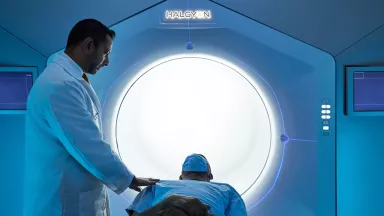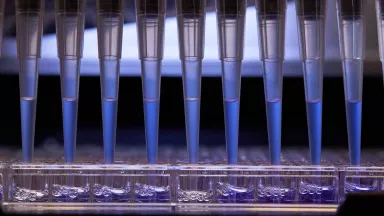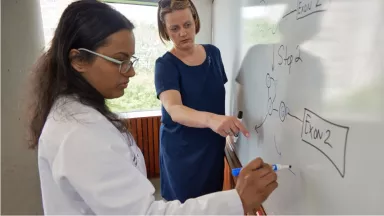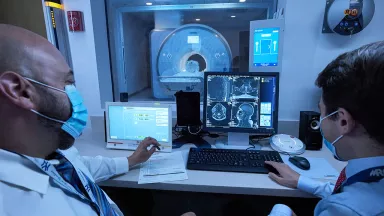Kidney Cancer Genetics
Having certain hereditary syndromes can increase a person’s risk of kidney cancer. Hereditary kidney cancer accounts for only five to eight percent of all kidney cancers, making it rare. There are four types of hereditary kidney cancer syndromes, and at Montefiore Einstein Comprehensive Cancer Center we treat them all. We’re passionate about screening for these hereditary kidney cancers and many other cancer types at our NCI-designated Comprehensive Cancer Center.
Our kidney cancer genetics program focuses on identifying your risk for cancer, so you can take steps to protect your health. We are at the forefront of new and innovative methods for preventing and treating kidney cancer. Our research leads to breakthroughs in care and world-renowned cancer specialists are passionate about offering the latest diagnostic approaches and treatments that can improve outcomes for patients.
To provide you with the most advanced care, you’ll have access to world-renowned specialists collaborating with critical care and nuclear medicine experts, nutritionists and pathologists, as well as psychosocial oncologists and thoracic cancer care navigators. And you’ll find the care you need in our state-of-the-art facilities.
For more than 50 years, Montefiore Einstein Comprehensive Cancer Center has been a leader in the research, diagnosis and treatment of over 200 types of cancer. Turn to us for comprehensive cancer screening.

Cancer Clinical Trials
- Blood & Bone Marrow Cancers
- Brain, Spine & Central Nervous System Cancers
- Breast Cancer
- Childhood Cancers
- Endocrine System Cancers
- Gastrointestinal (GI) Cancers
- Genitourinary (GU) & Urologic Cancers
- Gynecologic Cancers
- Head & Neck Cancers
- Kaposi Sarcoma & AIDS-Related Cancers
- Lung & Chest Cancers
- Prostate Cancer
- Sarcomas
- Skin Cancer
As an NCI-designated comprehensive cancer center, Montefiore Einstein Comprehensive Cancer Center supports the mission and guidelines of the National Cancer Institute (NCI). The following information about types of cancer, prevention and treatments is provided by the NCI.
Genetics of Renal Cell Carcinoma (PDQ®)–Health Professional Version
Inheritance and Risk of Renal Cell Carcinoma
In This Section
- Natural History of Renal Cell Carcinoma
- Family History as a Risk Factor for Renal Cell Carcinoma
- Other Risk Factors for Renal Cell Carcinoma
Renal cell carcinoma (RCC) is commonly diagnosed in both men and women. In the United States in 2025, about 80,980 new cases of kidney cancer and renal pelvis cancer will occur, along with an estimated 14,510 deaths.[1] These cancers account for about 3.97% of all adult malignancies.[1] The male-to-female ratio is 1.9:1.[2] RCC is distinct from kidney cancer that involves the renal pelvis or renal medulla, and it only applies to cancer that forms in the lining of the kidney bed (i.e., in the renal tubules). This summary does not address non-RCCs of the kidney, including cancer of the renal pelvis or renal medulla. Genetic pathogenic variants have been identified as the cause of inherited cancer risk in some RCC-prone families; these pathogenic variants are estimated to account for only 5% to 8% of RCC cases overall.[3,4] It is likely that other undiscovered genes and background genetic factors contribute to the development of familial RCC along with nongenetic risk factors.
Studies of several sequencing cohorts have evaluated patients with RCC using genetic testing panels that included many genes not previously associated with hereditary RCC. Many of these cohorts reinforce that the rate of germline alterations in classic RCC genes aligns with prior estimates. These cohorts also show a high incidence of other pathogenic variants, some of which occurred in DNA repair genes. The rate of other pathogenic alterations ranged from 12.8% to 17.0%.[5-9] The incidence of other pathogenic alterations is higher than would be expected in the population. However, these cohorts are not population-based, and they are significantly enriched for cancer patients who have been recommended for germline testing.
A retrospective single-center study of patients with early-onset RCC (diagnosed before age 46 y), found that participants with clinical phenotypes suggestive of RCC-associated pathogenic variants—like bilateral or multifocal tumors, non–clear cell renal histology, and extra-renal primary cancers—had the highest yields on germline RCC panel testing.[10] There were 129 patients with clear cell RCC. A subset analysis of patients with unifocal, clear cell RCC did not reveal pathogenic variants on RCC genetic testing panels. Other studies have confirmed that individuals with bilateral or multifocal tumors were more likely to have a pathogenic variant in an RCC- or cancer-related gene.[11] However, 5% to 10% of individuals in these series had pathogenic variants in non-RCC–associated genes—primarily in DNA repair genes.[10,11] At this time, it is unclear if there is a causal relationship between RCC and these pathogenic alterations; the relationship requires additional study. It is plausible that these pathogenic variants increase RCC risk. However, RCC risk could also be elevated by other factors like an enriched population of high-risk individuals or overdetection of RCC from frequent scans in high-risk patients.
In contrast, several studies reported that the incidence of germline pathogenic variants is much lower (4.1% to 6.4%) in unselected individuals with RCC who underwent sequencing during a research study.[12,13] Most variants identified in these series were in genes classically associated with RCC. This finding suggests that the population studied may greatly influence the detection rate of pathogenic variants in cancer predisposition genes that are not typically associated with RCC.
RCC occurs in both sporadic and heritable forms. Four major RCC syndromes with autosomal dominant inheritance have been identified. PDQ summaries are available for each of these syndromes:
- Von Hippel-Lindau Disease (VHL).
- Hereditary Leiomyomatosis and Renal Cell Cancer (HLRCC).
- Hereditary Papillary Renal Carcinoma (HPRC).
- Birt-Hogg-Dubé Syndrome (BHD).
For more information about sporadic kidney cancer, see Renal Cell Cancer Treatment and Transitional Cell Cancer of the Renal Pelvis and Ureter Treatment.
Natural History of Renal Cell Carcinoma
The natural history of each RCC syndrome is distinct and influenced by several factors, including histological features and underlying genetic alterations. Although it is useful to follow the predominant reported natural history of each syndrome, each affected individual must be evaluated and monitored for occasional individual variations. The individual prognosis depends on the characteristics of the renal tumor at the time of detection and intervention, which differs for each syndrome (VHL, HLRCC, HPRC, and BHD). Prognostic determinants at diagnosis include the stage of the RCC, whether the tumor is confined to the kidney, primary tumor size, Fuhrman nuclear grade, and multifocality.[14-16]
Family History as a Risk Factor for Renal Cell Carcinoma
Kidney cancer and renal pelvis cancer account for about 3.97% of all adult malignancies in the United States.[1] Epidemiological studies of RCC suggest that a family history of RCC is a risk factor for the disease.[4,17,18] An analysis of individuals with RCCs diagnosed before the year 2000 in the Sweden Family-Cancer Database included all Swedes born since 1931 and their biological parents. The study observed that the risk of RCC was particularly high in the siblings of those with RCC. Siblings of individuals with RCC had a higher relative risk (RR) than parent-child pairs.[17] Further work from this database confirms that 3% of individuals with RCC had a first-degree relative (FDR) with RCC.[19] Risk may be higher in individuals who have multiple FDRs with RCC and in women. Another study examined all patients in Iceland who developed RCC between 1955 and 1999 (1,078 cases). Investigators used an extensive computerized database to perform a unique genealogical study that included more than 600,000 Icelandic individuals. Results revealed that nearly 60% of Icelandic patients with RCC had a FDR or a second-degree relative (SDR) with RCC. Siblings of patients with RCC had an estimated RR of 2.5.[4] In a Korean study, individuals who had FDRs with RCC had a 2.29-fold increased risk of RCC. Risk did not appear to differ whether the FDR was a mother, father, or a sibling.[20] Modifying factors like obesity and hyperglycemia may further increase RCC risk in this high-risk population. Another study evaluated 80,309 monozygotic twins and 123,382 same-sex dizygotic twins in Denmark, Finland, Norway, and Sweden.[18] This study found excess cancer risk in twins whose co-twin was diagnosed with cancer. The estimated cumulative risks were an absolute 5% higher (95% confidence interval [CI], 4%–6%) in dizygotic twins (37%; 95% CI, 36%–38%) and an absolute 14% higher (95% CI, 12%–16%) in monozygotic twins (46%; 95% CI, 44%–48%)—for those whose co-twin also developed cancer—than in the overall cohort (32%). Overall heritability of cancer, calculated by assessing the relative contribution of heredity versus shared environment, was estimated to be 33%. Kidney cancer heritability was estimated to be 38% (95% CI, 21%–55%). Shared environmental factors did not significantly contribute to overall risk.
Young age at RCC onset is also a clue that hereditary etiology is possible. Unlike sporadic RCC, which is generally diagnosed during the fifth to seventh decades of life, hereditary forms of RCC are generally diagnosed at an earlier age. In a review of more than 600 cases of hereditary RCC from the National Cancer Institute, the median age of RCC diagnosis was 37 years, with 70% of cases being diagnosed at age 46 years or younger.[3] This age is lower than the median age of RCC diagnosis in the general population, which is 64 years.[21] Heritable RCCs are often multifocal and bilateral. A retrospective analysis of 1,235 patients with RCC who underwent genetic testing revealed that 6.1% of this population had positive genetic test results, 75.5% had negative test results, and 18.4% had a variant of unknown significance. Young age at RCC diagnosis was the only variable associated with a positive test result.[8] Other series showed that patients with non-clear cell advanced RCC may have an enrichment for pathogenic variants when compared with patients who had clear cell RCC; however, current research data are limited.[5,22]
While there is much debate about the referral criteria for hereditary RCC genetic testing, the following organizations have offered some guidance:
- VHL Alliance.
- Kidney Cancer Research Network of Canada.[23]
- National Comprehensive Cancer Network.[24]
These guidelines acknowledge that the following criteria can prompt a referral to genetic counseling: early age of RCC onset, family history of RCC (≥1 FDR/SDR with RCC), bilateral or multifocal RCCs, and suspicious RCC histology. A consensus statement published by a group of kidney cancer experts provides additional guidance that may help providers identify patients who can be referred to genetic counseling.[25]
When evaluating patients at risk of hereditary kidney cancer, specific clinical features help determine which test is the most appropriate to order. Single gene tests are available during family variant testing or when there is only suspicion for one specific kidney cancer syndrome. The following panel tests are also available: 1) broad cancer genetic panels of up to 100 genes associated with cancer predisposition, and 2) renal cancer genetic panels with 15 to 20 genes that have strong associations with hereditary kidney cancer syndromes. Most of these panels conduct targeted sequencing of the exon with little coverage of the intron, except for splice-site variants. In the future, RNA testing may be useful to evaluate variants of unknown significance identified by DNA testing, to add additional support for pathogenicity. Whole genome sequencing (WGS) can be considered for rare cases with clinical suspicion that had negative panel testing. WGS may detect structural variants in introns that can contribute to cancer predisposition. In a series of over 1,300 unselected patients with RCC who underwent WGS, 6.9% of patients had germline pathogenic variants identified in cancer predisposition genes.[12]
Other Risk Factors for Renal Cell Carcinoma
Studies of environmental and lifestyle factors contributing to the risk of RCC focus almost exclusively on sporadic (i.e., nonhereditary) RCC. Smoking, hypertension, and obesity are the major environmental and lifestyle risk factors associated with RCC.[26] In addition, workers who were reportedly exposed to the environmental carcinogen trichloroethylene developed sporadic clear cell RCC, presumably resulting from somatic variants in the VHL gene.[27] Dietary intake of vegetables and fruits has been inversely associated with RCC. Greater intake of red meat and milk products have been associated with increased RCC risk, although not consistently.[28]
References
Major Heritable Renal Cell Carcinoma Syndromes
There are four major hereditary renal cell carcinoma (RCC) syndromes. These syndromes are summarized in detail in the following PDQ summaries and in Table 1 below:
- Von Hippel-Lindau Disease (VHL).
- Hereditary Leiomyomatosis and Renal Cell Cancer (HLRCC).
- Hereditary Papillary Renal Carcinoma (HPRC).
- Birt-Hogg-Dubé Syndrome (BHD).
These major RCC syndromes are transmitted via an autosomal dominant mode of inheritance. This means that the altered gene is present in one of the parents and that the chances of transmitting this gene and the disease to the offspring is 50% for each pregnancy. Genetic tests performed in Clinical Laboratory Improvement Amendments (CLIA)-certified laboratories are available for the genes associated with VHL, HLRCC, HPRC, and BHD. Genetic counseling is a prerequisite for genetic testing. For more information, see Cancer Genetics Risk Assessment and Counseling.
References
Latest Updates to This Summary (05/09/2025)
The PDQ cancer information summaries are reviewed regularly and updated as new information becomes available. This section describes the latest changes made to this summary as of the date above.
Inheritance and Risk of Renal Cell Carcinoma
Updated statistics with estimated new cancer cases and deaths for 2025 (cited American Cancer Society as reference 1).
Family History as a Risk Factor for Renal Cell Carcinoma
Added American Cancer Society as reference 1.
This summary is written and maintained by the PDQ Cancer Genetics Editorial Board, which is editorially independent of NCI. The summary reflects an independent review of the literature and does not represent a policy statement of NCI or NIH. More information about summary policies and the role of the PDQ Editorial Boards in maintaining the PDQ summaries can be found on the About This PDQ Summary and PDQ® Cancer Information for Health Professionals pages.
About This PDQ Summary
Purpose of This Summary
This PDQ cancer information summary for health professionals provides comprehensive, peer-reviewed, evidence-based information about the genetics of renal cell carcinoma. It is intended as a resource to inform and assist clinicians in the care of their patients. It does not provide formal guidelines or recommendations for making health care decisions.
Reviewers and Updates
This summary is reviewed regularly and updated as necessary by the PDQ Cancer Genetics Editorial Board, which is editorially independent of the National Cancer Institute (NCI). The summary reflects an independent review of the literature and does not represent a policy statement of NCI or the National Institutes of Health (NIH).
Board members review recently published articles each month to determine whether an article should:
- be discussed at a meeting,
- be cited with text, or
- replace or update an existing article that is already cited.
Changes to the summaries are made through a consensus process in which Board members evaluate the strength of the evidence in the published articles and determine how the article should be included in the summary.
The lead reviewers for Genetics of Renal Cell Carcinoma are:
- Alexandra Perez Lebensohn, MS, CGC (National Cancer Institute)
- Brian Matthew Shuch, MD (UCLA Health)
- Ramaprasad Srinivasan, MD, PhD (National Cancer Institute)
Any comments or questions about the summary content should be submitted to Cancer.gov through the NCI website's Email Us. Do not contact the individual Board Members with questions or comments about the summaries. Board members will not respond to individual inquiries.
Levels of Evidence
Some of the reference citations in this summary are accompanied by a level-of-evidence designation. These designations are intended to help readers assess the strength of the evidence supporting the use of specific interventions or approaches. The PDQ Cancer Genetics Editorial Board uses a formal evidence ranking system in developing its level-of-evidence designations.
Permission to Use This Summary
PDQ is a registered trademark. Although the content of PDQ documents can be used freely as text, it cannot be identified as an NCI PDQ cancer information summary unless it is presented in its entirety and is regularly updated. However, an author would be permitted to write a sentence such as “NCI’s PDQ cancer information summary about breast cancer prevention states the risks succinctly: [include excerpt from the summary].”
The preferred citation for this PDQ summary is:
PDQ® Cancer Genetics Editorial Board. PDQ Genetics of Renal Cell Carcinoma. Bethesda, MD: National Cancer Institute. Updated <MM/DD/YYYY>. Available at: https://www.cancer.gov/types/kidney/hp/renal-cell-carcinoma-genetics. Accessed <MM/DD/YYYY>. [PMID: 26389510]
Images in this summary are used with permission of the author(s), artist, and/or publisher for use within the PDQ summaries only. Permission to use images outside the context of PDQ information must be obtained from the owner(s) and cannot be granted by the National Cancer Institute. Information about using the illustrations in this summary, along with many other cancer-related images, is available in Visuals Online, a collection of over 2,000 scientific images.
Disclaimer
The information in these summaries should not be used as a basis for insurance reimbursement determinations. More information on insurance coverage is available on Cancer.gov on the Managing Cancer Care page.
Contact Us
More information about contacting us or receiving help with the Cancer.gov website can be found on our Contact Us for Help page. Questions can also be submitted to Cancer.gov through the website’s Email Us.
Updated:
Source URL: https://www.cancer.gov/node/657735/syndication
Source Agency: National Cancer Institute (NCI)
Captured Date: 2013-11-05 15:00:17.0








